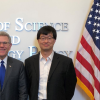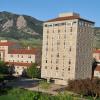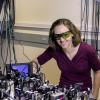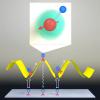Headlines
 Charles Tahan, Assistant Director for Quantum Information Science at the White House OSTP—as well as the director of the National Quantum Coordination Office (NQCO)—featured Q-SEnSE in the Dec. 3 edition of "Letters from the NQCO Director," spotlighting its leadership in quantum sensing.
Charles Tahan, Assistant Director for Quantum Information Science at the White House OSTP—as well as the director of the National Quantum Coordination Office (NQCO)—featured Q-SEnSE in the Dec. 3 edition of "Letters from the NQCO Director," spotlighting its leadership in quantum sensing. JILA Fellow Cindy Regal has been named the first recipient of the Baur-SPIE Endowed Chair in Optics and Photonics, JILA's first-ever endowed chair position. Regal's group at JILA pursues a wide range of research in optics and photonics, particularly employing lasers to control and probe quantum objects.
JILA Fellow Cindy Regal has been named the first recipient of the Baur-SPIE Endowed Chair in Optics and Photonics, JILA's first-ever endowed chair position. Regal's group at JILA pursues a wide range of research in optics and photonics, particularly employing lasers to control and probe quantum objects. Scientists believe we are living in the Second Quantum Revolution, a period of rapid advances in technology based on discoveries in quantum science. Companies from IBM and Google to small startups are eager to create and perfect these new technologies—and that requires training a new kind of workforce.
Scientists believe we are living in the Second Quantum Revolution, a period of rapid advances in technology based on discoveries in quantum science. Companies from IBM and Google to small startups are eager to create and perfect these new technologies—and that requires training a new kind of workforce. SU(N) fermion systems are multi-component, spin-symmetrical collections of atoms—unique among degenerate gases. The Ye Group found that SU(N) fermion systems display special properties that allow them to be quickly cooled and prepared for use in quantum-matter based atomic clocks.
SU(N) fermion systems are multi-component, spin-symmetrical collections of atoms—unique among degenerate gases. The Ye Group found that SU(N) fermion systems display special properties that allow them to be quickly cooled and prepared for use in quantum-matter based atomic clocks. The White House Office of Science and Technology Policy and the U.S. Department of Energy have announced that JILA and CU Boulder’s Jun Ye will be one of the members of the National Quantum Initiative Advisory Committee (NQIAC).
The White House Office of Science and Technology Policy and the U.S. Department of Energy have announced that JILA and CU Boulder’s Jun Ye will be one of the members of the National Quantum Initiative Advisory Committee (NQIAC). A new $25 million center to advance quantum science funded by the National Science Foundation on CU Boulder’s campus and at 11 other organizations around the U.S. and abroad has deep roots in CU Engineering’s interdisciplinary research efforts.
A new $25 million center to advance quantum science funded by the National Science Foundation on CU Boulder’s campus and at 11 other organizations around the U.S. and abroad has deep roots in CU Engineering’s interdisciplinary research efforts. The DOE has awarded $115M over five years to the Quantum Systems Accelerator, a new research center that will include CU Boulder. Led by Lawrence Berkeley National Lab, the center will forge the solutions needed to harness quantum information science for discoveries that benefit the world.
The DOE has awarded $115M over five years to the Quantum Systems Accelerator, a new research center that will include CU Boulder. Led by Lawrence Berkeley National Lab, the center will forge the solutions needed to harness quantum information science for discoveries that benefit the world. Cindy Regal, associate professor of physics at CU Boulder, has been selected as the 2020 recipient of Research Corporation for Science Advancement (RCSA)’s Cottrell Frontiers in Research Excellence and Discovery (FRED) Award.
Cindy Regal, associate professor of physics at CU Boulder, has been selected as the 2020 recipient of Research Corporation for Science Advancement (RCSA)’s Cottrell Frontiers in Research Excellence and Discovery (FRED) Award. CU Boulder will receive a $25 million award from NSF to launch a new quantum science and engineering research center. The new center will be led by physicist Jun Ye and is a partnership with 11 other research organizations in the United States and abroad.
CU Boulder will receive a $25 million award from NSF to launch a new quantum science and engineering research center. The new center will be led by physicist Jun Ye and is a partnership with 11 other research organizations in the United States and abroad. Cooling and trapping atoms has helped scientists advance their understanding of atomic and quantum physics over several decades. Now it’s time to move on to more complex systems, like molecules. A new study from the Ye Lab has found a way to cool yttrium monoxide robustly and efficiently.
Cooling and trapping atoms has helped scientists advance their understanding of atomic and quantum physics over several decades. Now it’s time to move on to more complex systems, like molecules. A new study from the Ye Lab has found a way to cool yttrium monoxide robustly and efficiently.

